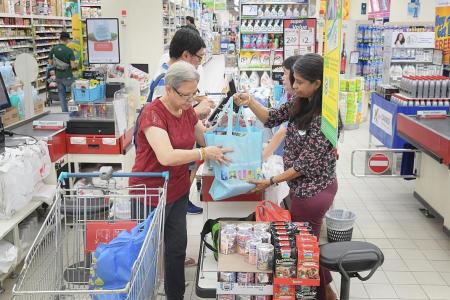Many back 'No Plastic Bag' move
Month-long exercise will shape FairPrice's future plans on curbing plastic bag use
No free plastic bag? No problem, said many shoppers at the start of FairPrice's "No Plastic Bag" trial yesterday.
What customers say, and do, during the month-long trial at seven outlets will shape the supermarket giant's future plans on curbing plastic bag use, said FairPrice chief executive Seah Kian Peng.
"At the end of this one-month trial, we will put all this together to see how we should rework, repackage or come out with a new scheme for implementation across the island."
While most of the more than 30 customers approached by The Straits Times said they supported the move to charge customers for plastic bags, others were upset.
As part of the trial - which was launched amid growing global awareness about the excessive use of single-use disposables - customers are charged 20 cents at some FairPrice stores, and 10 cents at selected Cheers and FairPrice Xpress convenience stores.
The money collected goes to the Singapore Children's Society and The Straits Times School Pocket Money Fund.
The stores taking part in the trial are FairPrice Xtra at Hougang One mall, FairPrice Finest at Zhongshan Mall, FairPrice at Tai Seng mall, FairPrice Xpress in Lorong Chuan and Cheers outlets at Sengkang Community Hospital, and in Create Way and Aljunied Road.
At Hougang One mall, shopper Charles Yap, 64, brought his own trolley to hold his groceries. "It is not too much of a hassle and it is much better for the environment," he said.
At Zhongshan Mall, housewife Cindy Goh, 64, paid for plastic bags - but did not mind.
"If FairPrice is giving the 20 cents to charity, I think it is okay, I don't mind paying. If it goes to FairPrice, I will bring my own bag," she said.
But some shoppers, used to getting the bags for free, were upset.
Said Ms Sonia Foo, 47, a senior manager of a charity: "All these plastic bags are not wasted because they are (used to) throw away with our refuse. It's not fair. That means we have to buy our own refuse bags."
At Tai Seng mall, a retiree in his 70s who wanted to be known only as Mr Yap said he did not know about the scheme until he was paying for his groceries. He ended up putting his groceries in a bag his wife had with her.
Plastic bags are made from crude oil and natural gas - fossil fuels that contribute to climate change. They are also a major cause of pollution worldwide.
Mr Seah said the trial aims to convey two key messages: "Can we first try to bring our own bag? And if we do need plastic bags, can we take the minimum number instead of the maximum?
"The real success is when each and every one of us realises we have a part to play." - ADDITIONAL REPORTING BY JACKLIN KWAN
Get The New Paper on your phone with the free TNP app. Download from the Apple App Store or Google Play Store now



